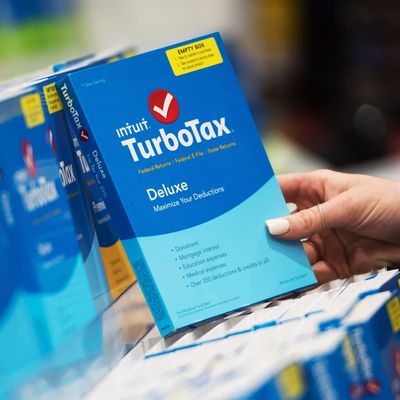
If Democrats and Republicans can agree on anything these days, it’s that the tax-filing process should be cheaper and easier for the American people — and also, that the IRS should be legally prohibited from making the tax-filing process cheaper and easier for the American people.
In Washington, there is an official, bipartisan consensus that the tax code should be “simplified,” and that April 15 should be a less fearsome day in the American imagination. But there is also an unofficial bipartisan consensus that preserving the profitability of the tax-preparation industry is more important than making your life easier. For this reason, congressional Republicans will invite Americans to “imagine filing your taxes on a form the size of a postcard” — but never to envision a world in which the government could actually just fill out your tax forms for you. Even though we all already live in such a world.
In Japan and the United Kingdom, most citizens don’t have to file any tax returns whatsoever. Instead, the state directly withdraws the exact amount it’s owned from workers’ paychecks, a process known as “precision withholding.” To account for potential deductions, the state simply examines public records for evidence of charitable donations, mortgage interest payments, or the like. Alternatively, the IRS could simply mail every American a pre-filled tax form, using salary data that the agency already possesses. Or better yet, the agency could develop free tax-filing software that Americans could use to access their pre-filled tax forms, review the information, correct any mistakes, and then submit to Uncle Sam — without even shelling out for a postage stamp.
Such a program would save virtually every American time, money, and worry. But it would also make TurboTax and H&R Block less profitable. And ordinary Americans do not have time to educate themselves about the Japanese tax system, or the money to pressure federal lawmakers into honoring their interests. The tax-preparation industry, by contrast, very much does. Thus, Congress is about to make it illegal for the IRS to develop free tax-filing software. As ProPublica reports:
Last week, the House Ways and Means Committee, led by Rep. Richard Neal, D-Mass., passed the Taxpayer First Act, a wide-ranging bill making several administrative changes to the IRS that is sponsored by Reps. John Lewis, D-Ga., and Mike Kelly, R-Pa.
In one of its provisions, the bill makes it illegal for the IRS to create its own online system of tax filing…“This could be a disaster. It could be the final nail in the coffin of the idea of the IRS ever being able to create its own program,” said Mandi Matlock, a tax attorney who does work for the National Consumer Law Center.
It’s no surprise that Republicans support such legislation. For all their rhetorical concern for the tax code’s complexity, the conservative movement has an investment in making taxation as conspicuous and painful as possible. (Grover Norquist once decried a proposal for return-free filing as a clear attempt “to raise taxes in a way that leaves politicians with clean hands.”) But how do Democrats rationalize backing such a provision?
The answer is simple (if unsatisfying). At present, the IRS has “a memorandum of understanding” with the tax-preparation industry: If the agency promises not to develop its own tax-filing software, the private tax-prep companies will provide free tax-filing software to all Americans who earn under $66,000. The pending bill would turn this (easily reversible) bureaucratic policy into binding law. Thus, Democrats can frame the proposal as an attempt to permanently secure free tax services for the bottom 70 percent of Americans.
But there are a couple of problems with such a framing. For one thing, there’s no reason why the most powerful government in human history should have to rely on private companies to provide this service. After all, the federal government could do this job better than the private sector, if it were allowed to, because it has unparalleled access to salary data. For another, if the public sector developed the relevant software itself, it could make free tax-filing universal at little additional cost.
But the biggest problem with the existing arrangement is that when you make a “free” service means-tested and privately administered, many low-income Americans will not realize that it exists. And in this case, only 3 percent of eligible U.S. taxpayers use the industry’s free program each year.
Americans deserve at least one political party that doesn’t support privatizing services — that would be better performed by the state — for the sole purpose of protecting entrenched corporate interests. Democrats cannot help TurboTax undermine the IRS, and then claim to be such a party.






























